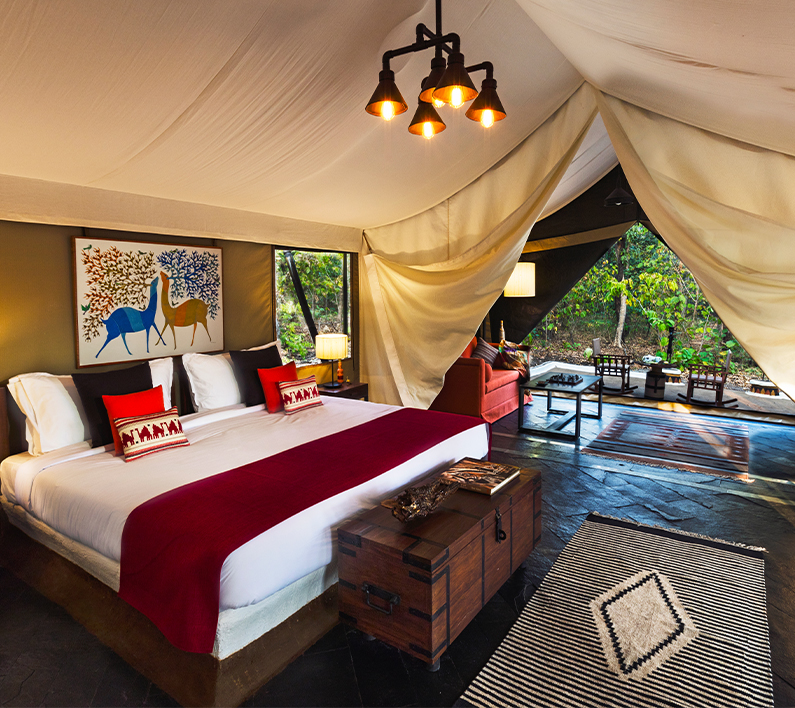Hotels and resorts located in wildlife zones are focusing on conservation
BY BINDU GOPAL RAO
Conscientious properties are working on overall awareness of how humans are damaging the planet and can reduce their negative impact. They do this by providing luxury hospitality without excess but with full comfort and elegance and minimal waste.
“We avoid as much plastic as possible, water is all freshly filtered, no plastic water bottles and no plastic cosmetic containers in the bathrooms. Also, a note about waste and minimising non-biodegradable and non-recyclable items is provided in the bedroom folder information. Since we both come from wildlife backgrounds, wildlife conservation is often a topic of conversation. We encourage visits to the tiger reserve; we show wildlife documentaries and we keep a natural landscape on the property so there is wildlife around also. Walks and boat rides also encourage understanding and conservation of the fauna and flora around. We also run an NGO whose main area of work is nature education, awareness, and research,” say Raghu Chundawat and Joanna Van Gruisen, Partners, Sarai at Toria.
DOING THEIR BIT
In terms of helping with conservation, these retreats are working closely to walk to the talk. For instance, WelcomHeritage Tadoba Vanya Villas Resort & Spa is committed to making a tangible difference in wildlife conservation. Located within Tadoba Andhari Tiger Reserve, one of India’s most renowned tiger reserves, they support various conservation initiatives, such as anti-poaching efforts and habitat restoration, to ensure the long-term survival of endangered species.
“By showcasing the beauty and biodiversity of the forest through a consciously immersive guest experience, we hope to foster a deep appreciation for nature and its delicate balance, inspiring action. Our conservation efforts to preserve the wildlife habitat in turn helps those in the local communities who depend upon these natural resources. We also collaborate with local artisans and producers, showcasing their crafts and products, thus creating a market for local goods. This not only empowers local craftsmen and women but also enriches the guest experience by offering authentic, locally sourced amenities,” says Hrishikesh Wachasunder, owner, WelcomHeritage Tadoba Vanya Villas Resort & Spa.
LOCAL LOVE
Jehan Numa Wilderness is making a case for wildlife conservation through working closely with local communities, employing more than 80 per cent local staff, contributing towards conservation projects done by forest department, and participating in grassroot education through adopting village schools in wilderness areas.
“We also practice regenerative tourism, where we have made our lodge premises thriving micro habitats for wildlife and biodiversity. We have worked closely with the forest department to empower the foot soldiers of conservation, the Forest Guard by enhancing the facilities in their patrolling camps. Jehan Numa Wilderness regularly engages with local park guides for timely training to enhance their skills and thereby income opportunities. We have also provided all park guides of Satpura Tiger Reserve with binoculars so that they are able to effectively carry out their guiding craft,” says Aly Rashid, Director, Jehan Numa Wilderness.
REGENERATIVE TOURISM
The retreats are also a fine example of how rejuvenating the land has helped build a new ecosystem that is ecologically sensitive too. Reni Pani, for instance, was established in 2009 on waste land surrounded by degraded forest. Now all the 35 acres within the premises are a thriving forest with animals, including large mammals like tigers, leopards, sloth bears, wild dogs passing through it.
Bori Safari Lodge, started in 2020, is close to a village and the habitat around it does not host large mammals. However, the team has planted native fruiting trees to enhance the birdlife and created a butterfly garden to enhance in indigenous butterfly species.
“While the leopard is a primary attraction in Jawai, our philosophy of showcasing ‘Jawai beyond the leopard’ is about creating experiences that don’t overburden the wilderness in the region. This is required for sustainable tourism here. Our experienced naturalists inform guests of conscientious efforts and our responsibility to preserve the wild habitat. Village visits and non-motorable nature walks for guests are encouraged,” says Suresh Kumar, General Manager, WelcomHeritage Cheetahgarh Resort and Spa.
GUEST ANGLE
When guests come to responsible tourism operations, their visit itself contributes towards conservation. When guests visit national parks, their tourism spend goes towards earnings for the local community. This tourism spends not only filters to the staff, but also to tourism guides, tourism drivers, vendors associated with tourism and a whole value chain that is involved in a micro economy in these forest landscapes.
“Usually, these forest landscapes are characterised by human populations with low income, and the introduction of responsible tourism and the alternative incoming opportunities that come with it has been a key contributor in the desire to conserve among the local communities. The permit fees in forest reserves in Madhya Pradesh goes back towards what is known as the park development fund which goes directly into conservation,” says Rashid.
CATCH ‘EM YOUNG
Retreats are also going the extra mile to encourage children and young adults to understand conservation. The NGO by Sarai at Toria provides nature and biodiversity education in many of the surrounding schools and also helps provide building infrastructure for these schools.
“We run health and eye camps in the local villages and run gender workshops and waste management education workshops in local villages. We also organise litter clean-ups with local school children,” says Chundawat.
At WelcomHeritage Cheetahgarh Resort and Spa, the team has introduced a ‘Young Naturalist’ programme for kids to get them to learn about the amazing birds in Jawai to encourage the love for wilderness, connect with nature, and realise the need to preserve this eco-balance from an early age.
So, the next time you embark on a holiday in the wild, remember you are also part of the conservation equation – so choose wisely and choose well.


